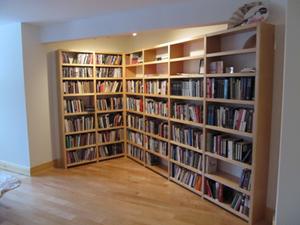"The bookshelf, like the book, has become an integral part of civilization as we know it, its presence in a home practically defining what it means to be civilized, educated and refined. Indeed, the presence of bookshelves greatly influences our behavior.... They are infrastructure." --Henry Petroski, The Book on the Bookshelf

|
|
| Before shelving commenced. |
|
A miracle is taking place. The books in our house are currently being alphabetized and organized by category--fiction, nonfiction, poetry and art. This is an epic undertaking. There, I said it. My long, un-alphabetized era of biblioshame is finally coming to an end.
The process does feel like bolstering infrastructure, and I'll tell you why. But first, a history lesson: In 2006, I wrote: "My living room is the closest thing I have to a personal library. On my bookshelves, which take up significant space in this large room, are, as you might suspect of a lifelong reader and longtime bookseller, hundreds of books. I've managed recently to get them into a kind of order--fiction, nonfiction, poetry, art--but alphabetization still eludes me."
That "order" was painfully short-lived, but last September, in a different house and city, I noted that we were planning an ambitious bookcase-building project. Several years had passed since the move, and our substantial book collection, while readily accessible, existed in a state of barely contained anarchy. Locating a particular title was often a fraught and disappointing enterprise. "This will change soon and our home will at last be fluent in the language of books," I wrote.
And so it has. There is a new bookcase upstairs for titles currently "in play," and our renovated basement guest room/library features bookshelves constructed to fit an intriguing wedge of space. A year-and-a-half after buying this house, we're beginning to feel that the infrastructure is finally near completion, as we dust and shelve books that have been huddled in exile for much too long.
I knew when we began this stage of the process there would be pleasure in seeing our books take on a less amorphous organizational shape, but there have been a few other surprises as well:
Shelving books as an amateur: For years, shelving was part of my job description as a bookseller. Bookcarts constantly emerged from the receiving area and finding time to shelve was a daily challenge, as well a matter of ongoing negotiations with colleagues. Now, however, I'm shelving as an amateur and it has been fun, which is a little shocking.
Unanticipated memories: My mother long ago gave me a four-volume, leather-bound set of Oscar Wilde's works, which had belonged to my grandfather. He spent his life working in Vermont marble mills. I have no memory of him reading... anything. But I have the mystery of these beautiful books, which I just rediscovered in a box.
 |
|
| Shelving in progress. |
|
Stunning inventory gaps: As the alphabetical infrastructure gradually filled in, I asked myself more than once: How can we not have a single title by ______? You fill in the blank. I'm too embarrassed.
Discovery: There it suddenly was, a book--almost in tatters from page-flipping and awash in marginalia--I hadn't seen for years and had long given up as MIA. I'm not going to tell you the title because you have some of these, too. Just imagine losing, and then finding, your book.
Loss: Even the discovery that a book I was certain had traveled along with us for years is no longer part of the herd can be a source of bittersweet pleasure. The realization provokes new questions: Where did it go? Should we get a new copy?
Javier Marías observed that "although the various apartments in which I've lived in various countries have always been very temporary and not, of course, mine, I have never been able to feel even minimally at ease in them until I have acquired a few books and placed them on the shelves, a pale reflection of that childhood bounty. Only then have I begun to think of the place in question, be it in England, the United States, or Italy, as habitable.... the walls need to be totally covered so that the books can speak to me through their closed mouths, their motley, multicolored, and very silent spines."
"Reshelving in the bookstore is never done," Granada Books, Santa Barbara, Calif., recently posted on Facebook. The same could be said for reshelving in the home, but we're getting closer every day. Our new bookcases, and the books gradually lining their shelves, have become a key part of the infrastructure that supports this house. --Robert Gray, contributing editor (column archives available at Fresh Eyes Now)

